
Photography 101: What Every Beginner Should Know
Photography is more than pressing a button.
Getting Familiar With Your Camera
The journey begins with your camera.
Whether you shoot with a compact point-and-shoot, the core principles remain the same.
Spend time testing autofocus and manual focus. Confidence with controls frees you to be creative.
Why Photos Depend on Light
Photography literally means “drawing with light.”
Morning light flattens harsh shadows.
Artificial sources let you shape mood.
Color warmth make or break an image.
Composition Basics
The way you place subjects matters as much as the subject itself.
Symmetry and balance improve clarity.
Experiment with breaking rules. Creative choices make images memorable.
The Role of Repetition
Photography takes time and practice.
Experiment in different lighting. Consistency grows skill.
Overexposed frames prepare you for improvement.
Why Editing Matters
Editing is where style emerges.
Simple phone apps crop composition.
Editing should support the story.
Publishing Photos
Images gain power when seen.
Online galleries provide encouragement.
Starting a blog adds professionalism.
Finding Style
It grows through experimentation.
Experiment with minimalism or detail. Each adds to your toolkit.
Your style will change, and that is natural.
Pitfalls and How to Overcome Them
Ignoring light direction happen to all beginners.
Not backing up files is avoidable.
Mindfulness turns errors into improvement.
Bonus Guidance
- Carry an extra memory card.
- Shoot in RAW format if possible.
- Dust shows in photos.
- Auto is easy but manual builds skill.
- Look at other photographers’ work.
Beginner Q&A
Q: Do I need an expensive camera?
A: No, skill matters more than gear.
Q: How long until I improve?
A: Consistency is more important than gear upgrades.
Q: Is editing cheating? here
A: Post-processing refines what the camera captures.
Q: Should I always follow rules?
A: Rules guide beginners but creativity matters most.
Photography Journey Ahead
Every photo is a step forward.
Challenge yourself often. With creativity and consistency, you’ll grow as an artist.
Whether as a hobby or a profession, momentum creates growth.
Understanding Photographers
Photographers document history.
Artists with cameras seek to improve their craft.
Photographers cover diverse genres, such as photojournalism. Each requires different techniques.
Experienced shooters study light carefully.
What Photographers Use
The best camera is the one you use, yet knowing options is important.
Cameras
DSLR cameras all have strengths and weaknesses.
Smartphones put photography in everyone’s hands.
Lenses
Different lenses tell different stories.
- Wide-angle lenses capture landscapes, architecture, and big scenes.
Choosing the right lens teaches photographers versatility.
Tripods and Stability
They help landscape and night photographers.
Lighting Equipment
Speedlights add portable control.
Extra Items in a Camera Bag
- Cleaning kits keep equipment safe and working well.
- Protective cases help photographers stay mobile and organized.
- Intervalometers expand creative options.
The Balance Between Gear and Skill
Many beginners believe expensive gear is required.
A professional with basic equipment can outperform a beginner with expensive gear.
Developing as a Photographer
Every photographer begins as a beginner.
Taking workshops connect you with mentors.
Where Photography Is Headed
Photography is check here evolving fast.
Drones and 360 cameras offer new creative options.
Still, the essence remains: capturing light, telling stories, and expressing ideas.
Final Thoughts
Tools help, but vision drives results.
The best advice remains simple: learn, practice, and keep shooting.